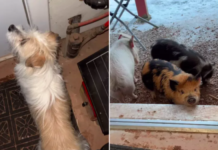Last Updated on September 20, 2021 by Fumipets
Dogs go through four phases of their life cycle: puppy, adolescent, adult, and senior. Individual dogs, like people and other animals, go through the phases of the life cycle at various speeds. The pace at which your dog ages is determined by variables such as heredity, diet, and the kind of care he or she gets.
Puppy
After around 63 days of gestation, the puppy stage of the life cycle starts. This period lasts from 6 to 18 months depending on the dog’s age. Your puppy should spend the first eight weeks of his life with his mother and siblings. During the puppy period, your dog is learning how to interact with people, other dogs, and other pets in his house, both while with his mother and after he comes to you. It’s critical to start house training and obtain your puppy’s full set of vaccines at this point in the life cycle.

Adolescent
Between the ages of 6 and 18 months, the puppy period will give way to puberty. Adolescence occurs sooner in smaller breed dogs than in bigger breed canines. Hormones start to kick in at this point in the life cycle, and if your dog isn’t spayed or neutered, he or she may start acting like a grumpy adolescent. Your dog will shed his puppy hair and mature into an adult, but he may feel uncomfortable in his new size and look gawky until he adjusts. Have your dog changed and consider obedience training at the start of this stage of the life cycle.

Adult
Your dog reaches the mature stage of life between the ages of one and three years. Smaller breeds, like adolescents, reach this period faster than bigger breeds. Your dog will still get plenty of exercise and fun throughout this period of the life cycle, but he won’t be as demanding of your attention and won’t have the same level of energy that kept you busy before. He’s most likely house-trained at this point. Consider if you need basic or advanced training. The mental and physical activity of learning will continue to benefit your older dog.

Senior
Your dog will enter the senior stage of the life cycle anytime between his sixth and tenth birthdays after he has reached adulthood. Larger breed dogs enter this stage of the life cycle earlier than smaller breed dogs, unlike adolescence and adulthood. Your dog’s muzzle will most likely begin to grey at this point in its life cycle. He’ll walk more slowly and be happy with a stroll rather than a fast game of fetch. Your elderly dog may eat less and sleep more than he did in previous years.



















